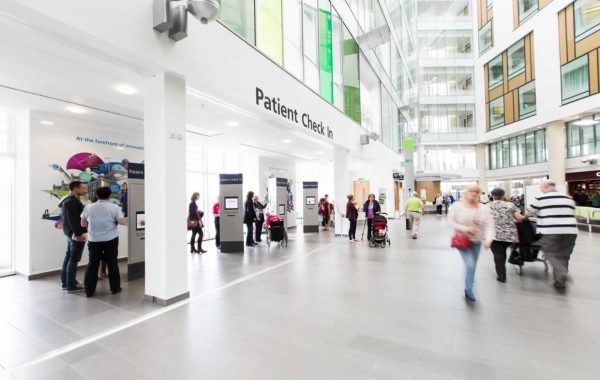Better Care: Improving efficiency in hospitals by predicting demand
NHS hospitals need to allocate beds, staff and funding in the best way possible, with limited resources but increasing demand. This issue has become urgent for many hospitals, especially as the number of people being admitted in an emergency is increasing.
A rise in emergency hospital admissions can lead to planned procedures and operations being cancelled, causing worry and anxiety for patients. It also puts more pressure on hospitals to cope with a backlog of procedures after periods of high demand.
Hospital computer systems contain live information about patients, staffing, beds and operating theatres. This data could be used to better predict demand for hospital beds for planned admissions. This would help hospital managers plan how to allocate resources in the longer term, making it easier to cope with surges in demand.
This project is funded through the Health Data Research UK (HDR UK) Better Care South West Partnership.
What we did
We carried out several pieces of work using existing local datasets for planned knee and hip replacement operations.
What we found and what this means
The impact of pausing planned hip and knee surgery during winter pressures
In the winter of 2017, the NHS paused planned hip and knee surgery for two months because of winter pressures. This created a ‘natural experiment’ where we could look at trends for these surgeries before and after the pause (between 2016 and 2019).
We found an immediate and sustained reduction in the number of knee replacements being done at the Trust following the pause. The average age for knee replacement increased after winter 2017, while the proportion of more deprived people having knee replacements decreased.
The ratio of public to private provision of hip and knee replacements dropped after winter 2017. This suggests an NHS-funded outsourcing of younger and less complex hip and knee replacement surgery to independent private providers.
The impact of restricted hip and knee surgery provision during the COVID-19 pandemic
The NHS suspended elective hip and knee replacement operations in April 2020 due to the COVID-19 pandemic. To understand the impact these restrictions had on the delivery of joint replacement surgery, we used data from one hospital to estimate the expected number of operations that could have taken place between January 2020 and June 2021. We compared this to the real number of operations that took place during that period.
We found that the number of hip and knee replacement procedures were lower than predicted. Approximately half of the expected number of operations were performed during the pandemic and the effect was greatest for revision knee replacements.
On average patients were also in hospital for one day less than they had been before the pandemic. They were also younger and had slightly more underlying health conditions than patients who were operated on before the pandemic.
Risk factors for extended hospital stays after knee replacement surgery
We looked at knee replacement surgeries that took place between 2016 and 2019 at one NHS Trust in England. During analysis we found that longer hospital stays were associated with:
- Being older
- Being female
- Coming from a deprived background
- Having additional health conditions
Staying in hospital despite being medically fit for discharge was associated with:
- Being older
- Being female
- Coming from a deprived background
The models we used to analyse this data could be used to identify which patients are likely to occupy hospital beds for longer. This could help hospitals schedule operations and improve efficiency.
Risk factors for extended hospital stays after hip replacement surgery
We looked at hip replacement surgeries that took place between 2016 and 2019 at one NHS Trust in England. During analysis we found that longer hospital stays were associated with:
- Being older
- Being female
- Having additional health conditions
Patients were also more likely to have a longer hospital stay or not be discharged despite being medically fit if they had recently been admitted to hospital (within last two months).
Staying in hospital despite being medically fit for discharge was associated with:
- Being older
- Being female
- Coming from a deprived background
What next?
Regulating patient flow through hospitals improves the working environment, reduces overcrowding and enables hospitals to provide better care for patients.
We will use this work to develop algorithms. These will help NHS trusts to better plan resources over a longer period. Understanding demand allows trusts to plan capacity, including beds, staffing levels and operating theatre time. This would help them to manage surges in demand and could lead to fewer cancelled operations.
Papers
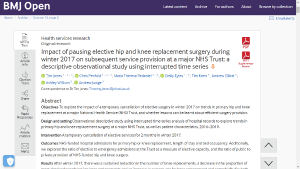
Impact of pausing elective hip and knee replacement surgery during winter 2017 on subsequent service provision at a major NHS Trust: a descriptive observational study using interrupted time series
Read the paper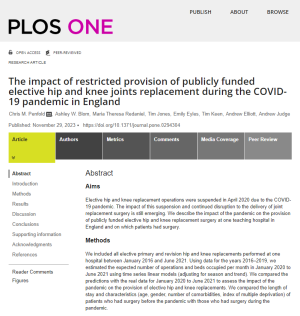
The impact of restricted provision of publicly funded elective hip and knee joints replacement during the COVID-19 pandemic in England
Read the paper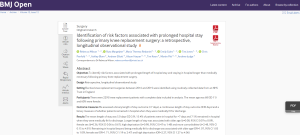
Identification of risk factors associated with prolonged hospital stay following primary knee replacement surgery: a retrospective, longitudinal observational study
Read the paper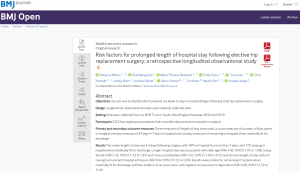
Risk factors for prolonged length of hospital stay following elective hip replacement surgery: a retrospective longitudinal observational study
Read the paperRelated research
This project builds on an earlier piece of work to improve how hospitals forecast unplanned admissions
Lead collaborators
- Professor Ashley Blom, University of Bristol
- Professor Andy Judge, University of Bristol
- Dr Chris Penfold, University of Bristol
- Professor Martin Pitt, University of Exeter
- Tim Keen, North Bristol NHS Trust
- Andrew Elliot, North Bristol NHS Trust
- Dr Tim Jones, University of Bristol
ARC West Staff
Dr Emily Eyles
Research Fellow, Quantitative ResearchDr Rebecca Wilson
Senior Research Associate in Quantitative Research and Evidence SynthesisPartners on this project
North Bristol NHS Trust
North Bristol NHS Trust is one of the largest teaching trusts in the country and serves the population of Bristol, South Gloucestershire and North Somerset. Their internationally renowned specialist areas include neurosciences, renal, orthopaedics, major trauma, urology, plastic surgery and neo-natal intensive care.
University of Bristol
The University of Bristol is internationally renowned and one of the very best in the UK, due to its outstanding teaching and research, its superb facilities and highly talented students and staff. Its students thrive in a rich academic environment which is informed by world-leading research. It hosts the Elizabeth Blackwell Institute for Health Research.
